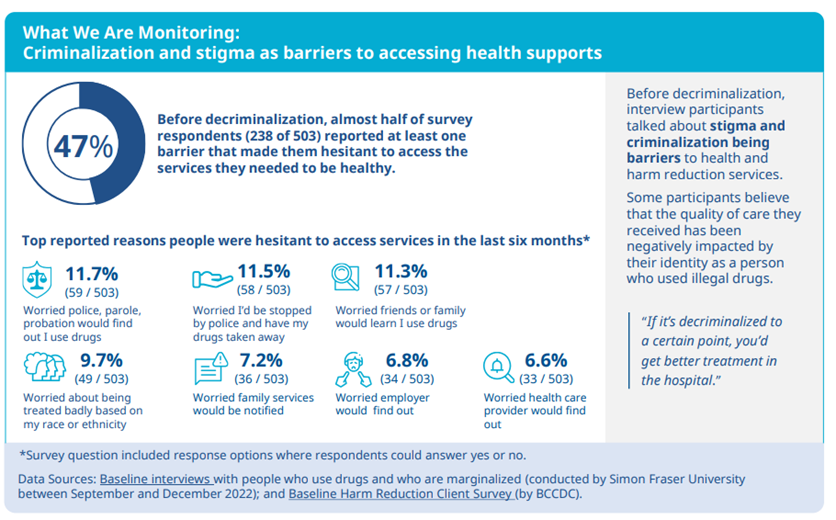Today marks the first anniversary of decriminalization legislation that came into effect on Jan. 31, 2023. For a three-year trial period, ending in 2026, the legislation removes the risk of drug seizures, arrests, criminal charges and convictions for possession of small amounts of illicit substances for personal use. By emphasizing that substance use is a health concern and not a criminal issue this legislation is meant to support people who use substances by reducing the barriers and stigma that prevent people from accessing life-saving supports. First Nations people remain disproportionately impacted by the province-wide public health toxic drug emergency.
Since decriminalization came into effect, there have been some positive outcomes, as identified by the British Columbia (BC) Ministry of Mental Health and Addictions:
- The use of drug checking services increased by about 60 per cent.
- Overdose Prevention Services (OPS sites) were accessed at significantly higher rates.
- There was a decrease of 76 per cent in possession charges from the past four-year average.
- The First Nations Health Authority (FNHA) and regional health authorities have hired outreach positions to support people who are using substances and connect them with harm reduction and treatment and recovery services.
Instead of criminalizing addiction and arresting people who use substances they are provided with information and voluntary referral to health care, harm reduction and treatment supports by law enforcement. The FNHA recognizes decriminalization is an important and necessary step toward removing stigma and humanizing people who use substances and addresses some of the harms that affect them.
Because there are different ways to respond to decriminalization, FNHA acknowledges and supports the self-determination of each First Nations community when considering implementing this exemption. FNHA works with all health authorities in BC and the Ministry of Mental Health and Addictions, to implement decriminalization in ways that will work best for the over 200 First Nations communities province-wide.
Decriminalization emphasizes that substance use is a health care issue and not a criminal matter. This is critical in reducing the fear and stigma that surround substances and the people who use them. FNHA recognizes the ongoing impacts of the devastating toxic drug emergency in First Nations communities and acknowledges that decriminalization is only one strand in the braid of harm reduction services that can lead to better health outcomes and keep people alive. By walking alongside communities and health authorities, FNHA is committed to ensuring decriminalization continues to be an exemption that will be a part of making progress in the toxic drug emergency.
In stating what decriminalization is, it is important to note what it is not:
- Decriminalization DOES NOT make drugs legal. They remain illegal.
- Selling (trafficking) drugs remains illegal.
- Decriminalization DOES NOT increase illicit drug use.
- It DOES NOT address the ongoing risk of toxic drug poisoning.
- It DOES NOT address the ongoing risk of the illicit toxic drug supply.
Before decriminalization, people who use substances cited stigma and criminalization as barriers to accessing health care and harm reduction services. According to a client survey conducted by the BC Centre for Disease Control between September and December 2022, the top reasons that people were hesitant to access health supports for substance use are highlighted below.

One year after decriminalization, there is still much work to do to make meaningful differences in the lives of people who use substances. Anti-stigma work needs to continue to combat fear and emphasize substance use as a health issue and not a criminal one. We need more investment in alternatives to the illicit toxic drug supply. And we need to continue to treat people who use substances with the humanity, dignity, love, and respect that they deserve.

